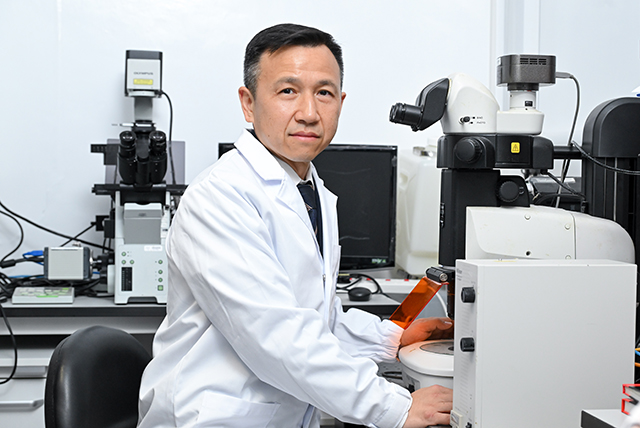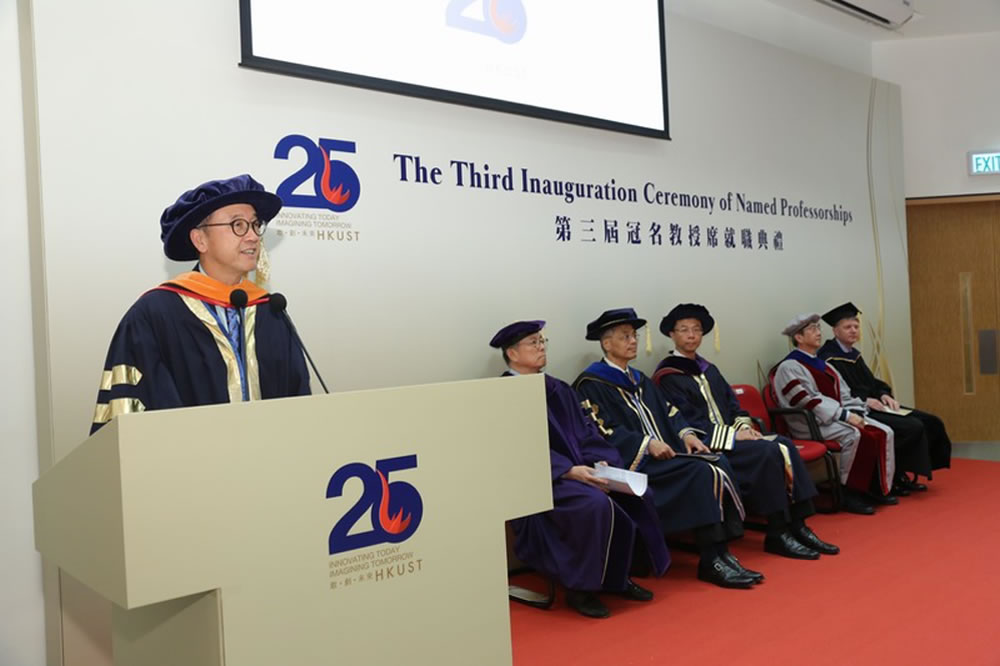Director of SIAT-HKUST Joint Laboratory for Brain Science
Associate Director of Laboratory Animal Facility
The human body’s ability to heal has one critical limitation: axons—the nerve fibers responsible for sight, sensation, and movement in the eyes, ears, and spinal cord—cannot regenerate naturally after injury. For millions living with spinal cord or nerve damage, this limitation often means lifelong challenges. At HKUST, Professor Kai Liu leads groundbreaking research to unlock the mechanisms regulating axonal regeneration and functional repair after central nervous system (CNS) injuries, offering hope where it once seemed impossible.
Prof. Liu’s journey began with a fundamental question: Why do some nerves heal while others do not? With a background spanning Peking University, Rutgers University, and Harvard Medical School, he joined HKUST in 2011 to explore this puzzle. Early in his career, he uncovered how genetic mechanisms inhibit axon regeneration, laying the groundwork for later breakthroughs.
In 2016, Prof. Liu and his team discovered that light could activate a protein called melanopsin, sparking axon regrowth in mice with optic nerve injuries. In 2020, the lab revealed that lipid metabolism—the production of specific lipid molecules in neurons—guides axon repair after optic nerve damage. The study demonstrated that the balance between triglycerides and phospholipids within neurons determines axon regeneration. After axon injury, elevated levels of Lipin1 and DGAT in neurons cause a shift towards triglyceride synthesis, which restricts regeneration. However, deletion of Lipin1 or DGAT activates the phospholipid synthesis pathway. This metabolic reprogramming favors phospholipid production and promotes axon regeneration. By 2023, his team uncovered an unexpected ally—the immune system. They showed that damaged nerves in the body’s periphery send signals to produce immune-related molecules, triggering self-repair. However, this mechanism is absent from the CNS. Artificially stimulating these immune pathways can promote axon regeneration within the CNS. This discovery reshaped the understanding of neural recovery, proving that regeneration is a collaborative process.
In 2024, his team suppressed the Lipin1 gene in mice with spinal cord injuries, enabling strong axon regeneration in the spinal cord by rewiring neuronal lipid metabolism and activating specific signaling pathways. Simultaneously, they uncovered how microglia—the CNS’s immune cells—form protective sheaths around injured axons to prevent axon degeneration. These discoveries, published in PNAS and Nature Communications, highlight potential therapies to shield and repair damaged nerves. In another leap forward, his team, together with the collaborator, partially restored vision in mice by combining optogenetic tools and growth factor receptors, bringing treatments for optic nerve damage closer to reality.
Building on this progress, Prof. Liu’s 2025 study introduced a novel intracranial optic tract injury model (pre-OPN OTI). Unlike traditional methods, this model avoids invasive tissue removal and positions injuries closer to target nuclei, enabling precise analysis of functional recovery. To further enhance regeneration efficiency and functional recovery, the team proposed a dual-intervention strategy of "axonal regeneration & synaptic enhancement." The knockdown of the lipid metabolism gene Lipin1, along with Pten/Socs3 knockout and CNTF expression, accelerated axonal regeneration and reduced pupillary light reflex (PLR) recovery time from 6 to 3 months. Additionally, overexpression of melanopsin was adopted to increase RGC photosensitivity or enhance presynaptic voltage-gated calcium channel activity, further optimizing synaptic signal transmission. This work highlights the essential role of specific neuronal subtypes in reconstructing functional circuits and provides new insights for developing targeted therapies for neural injuries and neurodegenerative diseases.
Beyond the lab, Prof. Liu fosters global collaboration through initiatives like the 2024 NSFC-BHKAEC Frontier Conference and the 2025 Frontiers in Neuroscience IAS Symposium. As a mentor, he guides students in international workshops, such as those at the Karolinska Institute, equipping the next generation of scientists with interdisciplinary skills.
Awarded as the Cheng Professor, Prof. Liu continues to advance HKUST’s mission of translating scientific curiosity into societal transformation. His team now focuses on understanding why some neurons regenerate while others remain dormant, transforming severe spinal injuries into treatable conditions, and identifying drug targets to rebuild neural circuits. While clinical trials are still on the horizon, each finding brings us closer to a future where nerve damage is no longer permanent.

 |













